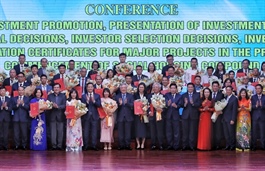Draft e-commerce law proposes 10 prohibited acts
Draft e-commerce law proposes 10 prohibited acts
The objective is to strengthen the legal framework to support sustainable sector development while protecting consumers.

An event to promote sustainable e-commerce in Hà Nội. — VNA/VNS Photo |
The draft Law on E-Commerce proposes 10 prohibited acts for online businesses amid the rapid growth of Việt Nam’s e-commerce market and the increasing sophistication of violations, in a bid to strengthen the legal framework to support sustainable sector development while protecting consumers.
The prohibited acts include: using e-commerce to illegally raise capital; committing fraud or deceiving customers; providing false or misleading information during administrative procedures or when supplying data to state authorities; operating multi-level marketing schemes without a valid licence; trading or enabling trade in prohibited goods and services, counterfeit products, items infringing intellectual property rights, smuggled goods, products of unknown origin, expired goods, or goods that fail to meet quality standards; participating in e-commerce on platforms that do not meet Việt Nam’s operational requirements; operating an e-commerce platform without completing required legal procedures; coercing or preventing users from registering with or using other platforms; employing algorithms or methods to restrict or prioritise product display without publicly disclosing selection criteria; and manipulating or concealing customer feedback, except where such feedback breaches the law or social ethics.
According to the Ministry of Industry and Trade, Việt Nam’s e-commerce sector ranked third in Southeast Asia by market size in 2024 and fifth globally in growth rate in 2022. The retail e-commerce market expanded from US$2.97 billion in 2014 to US$25 billion in 2024, recording an average annual growth rate of 20–30 per cent over the past decade. In 2024, the sector accounted for 10 per cent of total national retail sales of goods and consumer services.
This growth has made Việt Nam an attractive destination for foreign investment and has enabled Vietnamese consumers to become global buyers, accessing a wide range of domestic and international products. Many small and medium-sized enterprises have capitalised on modern platforms to expand distribution channels and reach broader markets.
However, alongside these opportunities, persistent issues threaten the sector’s integrity. Counterfeit goods, prohibited items, intellectual property infringements, and substandard products remain widespread in both traditional and online markets, with violations in the digital environment becoming increasingly complex. Regulatory authorities face difficulties in identifying sellers, which hampers the tracing and penalising of violators. These enforcement challenges heighten the risks of fraud, tax evasion, and insufficient consumer protection, according to industry experts.
Lack of transparency in seller information also undermines trust. When vendor details are incomplete or unclear, consumers cannot reliably assess credibility, which directly affects their rights and erodes confidence in e-commerce platforms.
Cross-border e-commerce has grown rapidly over the past decade, bringing additional layers of complexity to monitoring and enforcement. While this expansion offers significant economic potential, it also increases exposure to cross-border fraud, counterfeit goods, and jurisdictional gaps in enforcement.
The draft law reflects the need for a balanced approach, creating a robust legal framework that enables e-commerce to flourish while addressing its negative aspects. By combining measures to foster innovation and growth with strict enforcement against violations, Việt Nam can ensure a secure, transparent, and competitive digital marketplace that protects both consumers and legitimate businesses.
- 10:27 20/08/2025



























